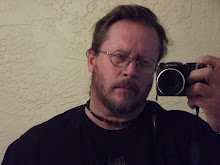

The Prisoner. How does one describe this thing? First it must be noted that it is a British television show from the 1960's. I still remember watching the reruns in the 1970's, as a kid. The premise, superficially, concerns an intelligence agent, ala James Bond or similar, who tries to escape his professional position and his unsatisfying life. But as he tries to retire, he is drugged and taken to a mysterious island. The island is populated with ostensibly happy people, and the environment is a lovely seaside village. And everyone is identified by a single number. Our protagonist is given the "name" Number 6.
Number 6 doesn't know why he's there at first, but then it becomes clear that some para-government entity has put him there. And all they WANT is for #6 to tell them WHY he resigned and WHAT he knows. And, generally, they want him to be a good citizen of the village, and conform, join-in, be nice... normal and friendly.
Of course, #6 immediately thinks of nothing else except ESCAPE.
In the end, the television series explores the relationship between an individual and the community. This is an ancient problem. The ancient Greeks ruminated excessively upon this very thing. And, philosophically, it is not in any way clear which is more important, the individual or the community in which he resides.
Our contemporary instincts tell us that the best good is that which is best for the most people. But it may come as a surprise that this is a rather new idea, or at least it's an idea which is only now popular, briefly, historically speaking. Surely it can be argued that great men, men like Socrates and Plato and Ben Franklin and Thomas Jefferson, are more important to the very core of mankind than the teeming masses.
In my own estimation, the individual is at least as important as the community, and perhaps is of greater value. The individual human must be protected and respected as the most precious thing alive. That's why we have laws protecting the lone man against the tyranny of the many. The lone man stands aside the group, forever glorious and irreplaceable.
With that said, here are some quotes from The Prisoner:
First, my favorite:
“I will not be pushed, filed, stamped, indexed, briefed, debriefed, or
numbered! My life is my own.”
--No.6; Arrival
And more. Peruse at your leisure:
New No.2: “Good day, Number Six.”
No.6: “Number what?”
New No.2: “Six. For official purposes, everyone has a number. Yours is number 6.”
No.6: “I am not a number, I am a
person.”
--Arrival
No.2: “We can treat folly with kindness . . . knowing that soon his wild spirit will quieten, and the foolishness will fall away to reveal a model citizen.”
No.6: “That day you'll never see.”
--Dance of the Dead
“Unlike me, many of you have accepted the situation of your imprisonment and will die here like rotten cabbages.”
--No.6; Free For All
The Queen: “I want to be near you.”
No.6: “And everybody's near in this place . . . far
too near.”
--Checkmate
No.2: “Tell me. . .are you still as keen as ever to leave us?”
No.6: “Any more questions?”
--The General
Chairman: “We deplore your spirit of disharmony.”
No.6: “That's a common complaint around here, isn't it?”
--A Change of Mind
No.2: “I assure you, that no matter what significance you may hold for me, to the Village and its Committee, you are merely Citizen Number Six, who has to be tolerated, and if necessary, shaped to fit.”
No.6: “Public Enemy
Number Six.”
--A Change of Mind
“You still have a choice. You can still salvage your right to be individuals. Your rights to truth and free thought! Reject this false world of Number Two . . . reject it
NOW!!”
--No.6; A Change of Mind
“He told [those kids] a . . . a blessed fairy tale. That one wouldn't drop his guard with his own
GRANDMOTHER!”
--No.2 [concerning No.6]; The Girl Who Was Death
AND THE FINAL TWO:
“He has revolted. Resisted. Fought. Held fast. Maintained. Destroyed resistance. Overcome coercion. The right to be a person, someone or individual. We applaud his
private war, and concede that despite materialistic efforts, he has survived
intact and
secure!”
--The President; Fall Out
“All that remains is . . . recognition of a
man.”
--The President; Fall Out
Final note:
I suppose, too, that I should tell you the ending of the entire TV series. So if you don't wish to know, then stop reading.
Throughout the series of episodes, Number 6 continued to plead to see Number ONE. But he could never get passed Number 2. Number ONE was the only person who could, in the end, grant Number 6 freedom. Of course, finally, Number 6 is allowed to meet Number One. And who does he meet? Himself. That's right, Number One is his own self. The entire time, the person who was holding Number 6 PRISONER was his own self, his own fears... A great metaphor, for sure, beyond all the concerns of society and the individual within. In the end, WE are the people who stop ourselves from success. We fear escape. We fear success. We enslave our own souls by adhering to the ideals of the familiar.
 I just posted these comments on Facebook, in regard to this painting:
I just posted these comments on Facebook, in regard to this painting:






















